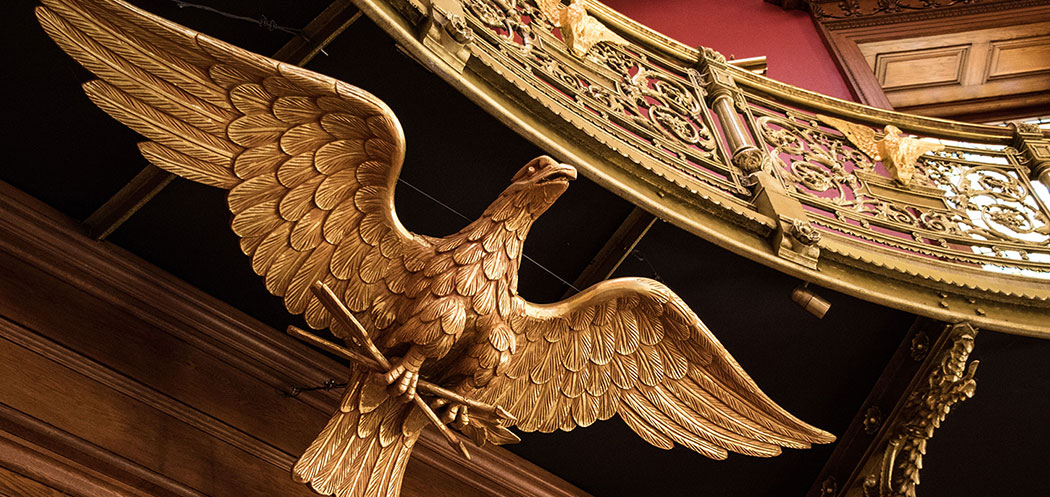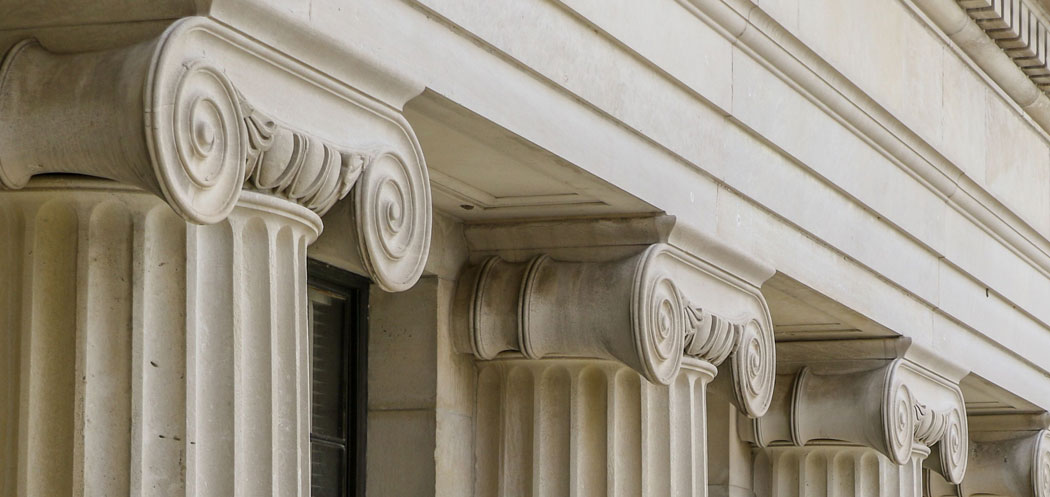The Branches of Government
The government of the State of New Jersey, like that of the United States, is divided into three coequal branches: the legislative, the executive, and the judicial. The principal function of the Legislature is to enact laws. The Executive Branch (the Governor, Lieutenant Governor and State agencies) carries out the programs established by law. The Judiciary (the Supreme Court and lower courts) punishes violators, settles controversies and disputes, and is the final authority on the meaning and constitutionality of laws.
Legislators
The Legislature consists of two Houses: a 40-member Senate and an 80-member General Assembly. The Senate and Assembly chambers are located in the State House in Trenton.
Senators must be at least 30 years old and residents of the state for four years prior to election. Members of the Assembly must be at least 21 and state residents for two years. All legislators must live in the districts they represent.
While legislators spend a considerable amount of their time on legislative matters, service in the Legislature is considered to be part-time, and most legislators also hold other employment.
Legislative Districts
Legislators are elected from 40 legislative districts of substantially equal population. The voters in each district elect one Senator and two members of the General Assembly.
Every ten years, after the Federal census, the boundaries of the 40 districts are redrawn to maintain an equal population in each district. This reapportionment of districts is performed by a bipartisan Apportionment Commission, whose members are appointed by the state chairs of the two major political parties.
Legislative Elections
Legislative elections are held in November of each odd-numbered year. Members of the Assembly serve two-year terms. Senators serve four-year terms, except for the first term of a new decade, which is only two years. This "2-4-4" cycle allows for elections from new districts as soon as possible after each reapportionment.
Interim appointments are made to fill vacant legislative seats by the county committee or committees of the party of the vacating person. The office is on the ballot for the next general election, unless the vacancy occurred within 51 days of the election. Then the appointment stands until the following general election.

Legislative Sessions
The New Jersey Constitution provides that each Legislature is constituted for a term of two years, split into two annual sessions. Because the Constitution also specifies that all business from the first year may be continued into the second year, the distinction between the two annual sessions is more ceremonial than actual. The two-year legislative term begins at noon on the second Tuesday in January of each even-numbered year. At the end of the second year, all unfinished business expires.
Each House sets its own meeting schedule. A typical session day consists of party conferences around midday followed by open debate and voting activity in the chambers. Occasionally, committee meetings may be held on days when legislative voting sessions occur, but typically committee meetings are held on another day. While both voting sessions and committee meetings are typically on Mondays and Thursdays, committee meetings and public hearings can be held on any day, at the discretion of the committee chair.
Committee meetings and voting sessions are open to the public. No advance arrangements are necessary to gain admission to the meeting rooms or the public galleries of the chambers. Access for joint sessions, however is limited. Joint sessions occur when the Senate and General Assembly meet together, most often for an address by the Governor.
Legislative Organization
Each House elects a presiding officer from among its members - the President of the Senate and the Speaker of the General Assembly. The Senate President and Assembly Speaker are second and third in line of succession to the governorship after the Lieutenant Governor.
The President and the Speaker have broad powers within their Houses. They decide the meeting schedules and the daily calendar of bills to be considered, preside over the sessions, appoint committee chairs and members, refer bills to committees for consideration, and direct the business of their Houses. The Houses elect a Senate Secretary and Clerk of the General Assembly, respectively, who supervise the business operations of the two Houses.
Each party in each House also chooses party leaders: the Majority Leader, the Minority Leader, assistant leaders, and "whips." The party leaders help develop party policy on the issues before the Legislature.
Each House establishes a number of standing reference committees to review legislation. Much of the discussion on the merits of a bill takes place in committee. Representatives of interest groups and members of the public are generally given the opportunity to present their views at committee meetings.
Party Influence
When the majority membership of either House belongs to the same political party, that party is said to “control” the House. The presiding officer is a member of the majority party and, in his or her official capacity, able to support the party’s policy goals by setting the agenda of the House. Committee chairs are members of the majority party, and committee membership usually reflects the partisan composition of the House.

Legislative Powers
The chief function of the Legislature is to enact laws. A proposal to make a new law, or to change or repeal an existing law, is presented to the Legislature as a bill. To become law, a bill must pass both Houses by a majority vote and be approved by the Governor. How a Bill Becomes Law presents the steps in the process.
The Legislature can also propose amendments to the New Jersey Constitution. Such an amendment must be passed by a vote of 3/5 of each House (24 votes in the Senate and 48 votes in the Assembly). No action by the Governor is required. If passed, the proposed amendment is placed on the ballot in November for a public vote. An amendment may also be presented to the voters if the Legislature passes it two years in a row by a majority vote.
Additional powers of the Legislature include Senatorial approval of the Governor's appointments of judges and other officials. The Legislature is also empowered to ratify amendments to the U.S. Constitution; appoint the State Auditor; judge the elections and qualifications of its members; and institute and conduct impeachment proceedings against State officials
At the general election in November 1992, the voters approved a constitutional amendment permitting the Legislature to review administrative rules and regulations.
Forms of Legislative Action
Formal legislative action is expressed through the passage of a bill, or by adoption of a resolution, which expresses the sentiments or opinions of the members. There are three types of resolutions. A joint resolution must pass both Houses and be signed by the Governor. A concurrent resolution must pass both Houses, but is not presented to the Governor. A simple resolution is considered only by the House in which it is proposed.
The Budget Process
The State operates on a fiscal year that begins on July 1 and ends the following June 30. The Governor delivers the annual budget message to the Legislature for the ensuing fiscal year on or before the third Tuesday following the first meeting of the Legislature, except in a gubernatorial inaugural year when it is delivered later. (Text of the proposed budget can be accessed at the State of New Jersey, the website for the Executive Branch.)
The proposed budget is then reviewed by the Senate Budget and Appropriations and the Assembly Budget Committees. Committee review of the Governor's budget proposals is conducted through staff research and a series of hearings during which members of the Executive Branch and the public provide testimony. In recent years legislative budget hearings have generally taken place during the months of March, April, and May.
The appropriations committees produce a budget in the form of an annual appropriations bill. As with any other law, the appropriations bill must be passed by both Houses and approved by the Governor (or enacted by overriding a veto). The budget must be signed by July 1.
Contacting Your Legislators
Legislators value the opinions and suggestions of their constituents. In addition, through their professionally staffed district offices, legislators are prepared to respond to requests for information about legislative matters or for assistance in dealing with State agencies.
You may call, write or email legislators at their district offices. Consult the Roster of Members listing on this website for district office addresses and phone numbers. Or you may write to your representatives either in care of:
New Jersey SenateState House
P.O. Box 099
Trenton, NJ 08625-0099
or in care of
New Jersey General AssemblyState House
P.O. Box 098
Trenton, NJ 08625-0098
When addressing mail to a legislator, the title "Honorable" should precede the representative's full name. The letter's salutation should read "Dear Senator" or "Dear Assemblyman/woman."
Legislative Staff
The Office of Legislative Services is the Legislature's non-partisan agency providing legal, fiscal, research, bill-drafting, and administrative services; committee staffing; computer database management; and public information programs and publications. It operates under the jurisdiction of the Legislative Services Commission, a bipartisan body consisting of eight members of each House appointed by the respective presiding officers. The Office of Legislative Services is housed within the State House Annex, with the exception of the Office of the State Auditor, which is located at 125 South Warren Street.
Each party in each House is served by a full-time partisan staff that operates under the direction of the party leadership. These partisan staffs provide research, policy, public relations, and administrative services for their respective party leaders, committee chairs, and individual legislators. Each of the four partisan staffs is headed by an Executive Director.
In addition, each legislator maintains a district office with professional staffing.